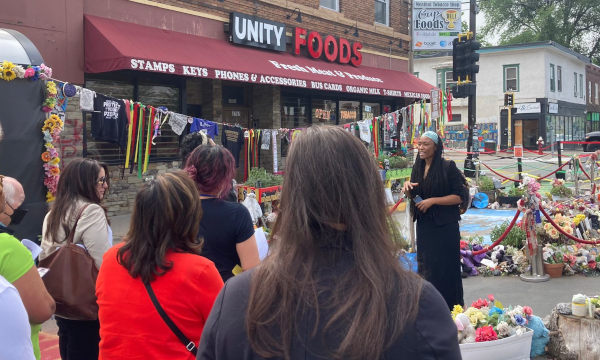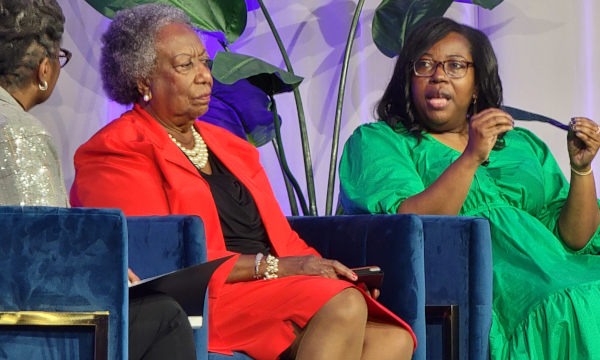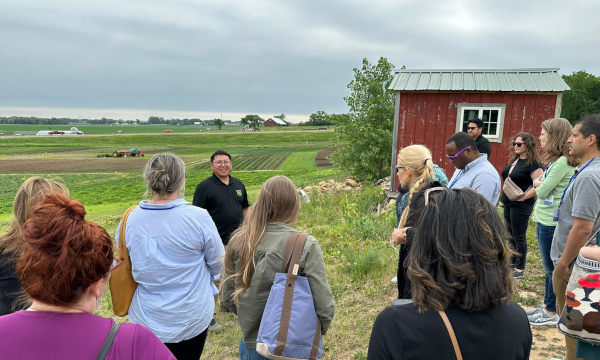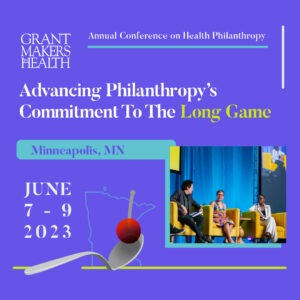Reporting from the 2023 Annual Conference on Health Philanthropy
“These are critical and trying times in our country, in our states, in our communities. Systems change is a team sport.”
–Dr. Laura Gerald, President of Kate B. Reynolds Foundation and GIH Board Chair
Today marked the official start of the 2023 Grantmakers In Health Annual Conference. Attendees were up bright and early to get to know Minneapolis, the home of this year’s conference and original site of the 2020 gathering. Morning yoga, community site visits, and multiple networking breaks all took place before the afternoon opening plenary session. The second half of the day featured learning labs and quick takes before the evening’s opening reception.
Spotlight on Plenaries
Dr. Cara V. James, President and CEO of Grantmakers In Health, opened this year’s annual conference with a reflection on the theme Advancing Philanthropy’s Commitment to the Long Game. James emphasized, “We cannot 30, 60, or 90-day-away these challenges.” Today’s challenges require long-term commitment to become tomorrow’s resolutions.
Following an introduction, the Opening Plenary, Harms and Healing: Grappling with Philanthropy’s Past, powerfully reinforced that building trust and addressing challenges is not just a to-do on an equity checklist, but a deeper connection between past, present, and future. As part of the panel discussion, Dr. Laura Gerald, GIH Board Chair and President of the Kate B. Reynolds Foundation, introduced Lillie Tyson Head, President of Voices for Our Fathers Legacy Foundation, an organization dedicated to transforming the legacy of the United States Public Health Service Study of Untreated Syphilis in Tuskegee and Macon County. Over the course of 40 years, 623 African American men received inadequate treatment for syphilis, and even when effective drugs became available, they were not treated or properly informed that they were part of a study.
The panel discussion also featured Christopher Koller, President of Milbank Memorial Fund. From 1935 to 1972, Milbank Memorial Fund played a role in the infamous study by paying for services associated with the burials of men who died over the course of the study when their families agreed to autopsies. While the “ethically unjustified” study has become public knowledge, Milbank never openly confronted or acknowledged their participation. In fact, when fellow panelist and Minnesota Representative Ruth Richardson, a Milbank Memorial Fund Emerging Leader, searched for an acknowledgement of the study on Milbank’s website, she came up short.
Koller shared the deep internal work the Milbank staff and Board did to apologize for their role in the study and also acknowledged their privilege to turn away from its harmful effects for so many years. To commit to sustained, long-term change, Milbank understood that grappling with philanthropy’s past would not be sufficient for healing. A phone call to Voices for Our Fathers Legacy Foundation turned into a public apology weekend in Tuskegee, a sustained connection to the Voices for Our Fathers leadership and descendants of the study, and a plan for long-term reparations.
Both Richardson and Tyson Head emphasized that funding alone does not create the conditions for healing, nor does it directly address the harm. But Milbank has become more explicit in their commitment to equity, using their past to amplify the ongoing work of healing. As Tyson Head noted during today’s session: You don’t move past these events—you move through them.



In addition to the opening plenary, conference attendees had the opportunity to join site visits across the Minneapolis area–including tours of the Hmong American Farmers Association (HAFA) Farm, the YMCA of the North, and George Floyd Square led by Centro de Trabajadores Unidos en la Lucha (CTUL) and Tending the Soil. Learning Labs and Quick Takes throughout the afternoon expanded on the current state of public health and ways philanthropy is innovating to ensure equitable care and sustainable community engagement.
Learning Lab Spotlight: Equity, Health, and Climate Change: Engaging in the Long Game–It’s a Marathon, Not a Sprint
Climate change is a health and equity crisis. In the past 24-hours alone, wildfires raging in Canada have affected air quality for millions of people in North America. While no one is isolated from climate change, the health impacts are unequal in their reach. Climate change disproportionately impacts people of color, people with low income, older adults, people with disabilities, and children. This learning lab highlighted multiple ways grantmaking action can support advocacy, education, policy, and program implementation as well as ways funders and foundations can incorporate health equity into their existing plans to help communities adapt to climate change. Following the speaker presentations, attendees had an opportunity to engage in small-group, scenario-based discussions to reflect on “running” the equity, health, and climate action marathon with other collaborators in the room.
This learning lab session was designed by The Commonwealth Fund and NorthLight Foundation and supported by The Heinz Endowments.
Quick Takes Spotlight: Innovative Field-Based Staffing Models for Community Engagement and Learning
Building trust within communities is essential for the organizations that grantmakers support. It is also critical for grantmakers to cultivate relationships with community leaders. But the path to activate those new relationships is not always clear. Sarah Moody, Policy Officer at Missouri Foundation for Health, and Valerie Black, Community Impact Officer at Kansas Health Foundation, shared their first-hand experiences in developing innovative community engagement programs and staffing models. It all starts with a simple question: “What does your community need?” Long-term connection starts with listening to grassroots experts and sharing resources, like space for meetings or tools for forming a 501c3. Moving ideas into action, Kansas Health Foundation recently launched the Building Power and Equity Partnership Program to provide core support for grassroots organizations who are working with communities with the greatest health disparities, and Missouri Foundation for Health launched a Community Liaison role. Through new approaches, both health foundations are thinking like grantmakers and changemakers.
Quick Take Spotlight: Empowering Consumers to Navigate the Health Care System: FAIR Health Initiatives
Information is key to any health decision. FAIR Health is dedicated to bringing transparency to health care costs and health insurance information through app- and website-based consumer tools that support shared decision-making (SDM). Session attendees were guided through an interactive demonstration of fairhealthconsumer.org, the largest repository of private healthcare claims in the country. Nicole Iny, the Senior Director, Grants & Consumer Education, FAIR Health, Inc., walked through dynamic decision aids and healthcare navigation checklists that have helped consumers understand their healthcare options, while ensuring they can prioritize their backgrounds and values in health decision-making. The session reinforced that while we may be grantmakers or public health experts, we are also patients. These tools were developed to support patients, particularly minority populations, but FAIR Health emphasized that these resources are for all.
This session was designed by FAIR Health, Inc. and The New York Community Trust, a funder of FAIR Health’s initiatives.
On the Ground
“I went on the Frontline Organizing in Post-Uprising Communities site visit this morning. The experience of being in George Floyd Square is difficult to put into words, but the ongoing commitment to justice and healing was so powerful. It was amazing to hear firsthand from leaders doing the hard work of community organizing on the ground.”
– Alison with Arcora Foundation
“The first day of the GIH Annual Conference on Health Philanthropy was inspirational in many ways. Most importantly, today I learned that I’ve been referring to one of the most shameful periods of public health research in the US incorrectly. Thanks to Mrs. Lillie Jewel Tyson Head, daughter of a man in the study, I will now call the study ‘the US Public Health Service Study on Untreated Syphilis in Tuskegee and Macon County, Alabama‘. It is not the ‘Tuskegee Study‘ because Tuskegee didn’t do the study, they were harmed in the study. I can’t wait to see what lessons arise from tomorrow’s sessions.”
– Jill Shumann, GIH Vice President for Programming
Fun fact: Minneapolis is the birthplace of the visionary musical artist, Prince, whose birthday happens to be today, June 7.

